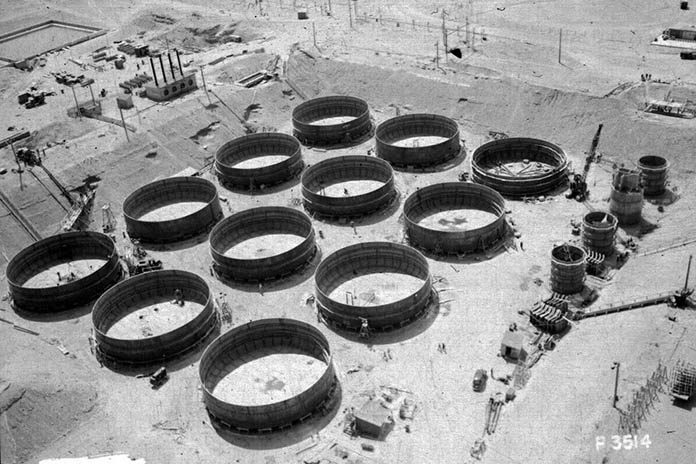By Alex Baumhardt/Oregon Capital Chronicle
A federal proposal to move radioactive nuclear waste from Washington through Oregon and onward to Utah and Texas via truck and rail has raised major concerns among Oregon officials and environmentalists.
The radioactive waste comes from the Hanford Site, near the Columbia River north of Richland, Washington, where 56 million gallons of radioactive sludge – a byproduct of World War II-era plutonium production – still sits 80 years later in 177 underground tanks, some of which are leaking.
To clean up the site and to remove the sludge, federal agencies and the Washington Department of Ecology could decide by the end of the year to move ahead with a proposal, negotiated mostly in private, to cart at least 2,000 gallons of sludge via rail or truck through Oregon to facilities in Utah and Texas that can process it into a grout cement and dispose of it. The proposal doesn’t yet detail a route, but critics have said it would most likely end up on major interstate highways through Oregon, or on a rail line through central Oregon along the Deschutes River, passing near areas like Bend and the Confederated Tribes of the Warm Springs Reservation.
The possibility of thousands of gallons of the waste moving through the state as a liquid, rather than in a solid form outlined in previous plans, are among the parts of the proposal that most alarm Oregon Gov. Tina Kotek and Janine Benner, director of the Oregon Department of Energy.
Both, in recent months, have written to officials at the U.S. Department of Energy, the Environmental Protection Agency and to Washington Gov. Jay Inslee, asking that they shelve the proposal until three critical issues are resolved. Namely, Kotek and Benner want an explanation for why the liquid won’t be solidified before transit, a federal environmental assessment that scrutinizes all the possible impacts a leak or spill could have in transit and greater involvement and outreach with potentially impacted communities.
“The ongoing process for receiving and accounting for input from the state of Oregon, tribal governments and the public on substantive issues relating to the solidification and transport of liquid tank waste is insufficient,” Kotek wrote, “and risks undercutting support for the accelerated reduction of radioactive waste at the Hanford site that is in everyone’s interest.”
Benner, of the Oregon Department of Energy, doubled down on Kotek’s concerns.
“The lack of clarity on these key areas, coupled with a not-yet-conducted process for engagement along potential transportation corridors, is a significant concern,” she wrote.
In response, Candice Trummell Robertson, a senior environmental management advisor for the U.S. Department of Energy, wrote to Kotek to say officials had not yet decided on a route for the waste, and that the agency would seek public comment once they defined a path in the fall. She said the agency was determining if an environmental impact analysis would be needed to move waste, but noted it had been done safely before.
“With respect to the means of transport of treated waste, the department has a long history of safely transporting radioactive materials, including significant quantities of liquid waste,” Trummell Robertson wrote.
Change of plans
For nearly three decades, the plan for cleaning up the Hanford Site was to build an onsite glass plant where radioactive waste could be blended into glass, trapping the dangerous substances in a solid form. But such a plant has not been completed, and in 2023, the Department of Energy learned it could more cheaply mix some of the waste into grout cement at existing facilities in other states. Utah and Texas also offer disposal sites with little potential for groundwater contamination.
Since plutonium production began at Hanford nearly 80 years ago, about one-third of the 177 tanks have leaked, according to the nonprofit Hanford worker and environmental safety group Hanford Challenge. The leaks have sent at least a million gallons of radioactive waste into the groundwater aquifer and onto the Columbia River over the years.
Dan Serres, advocacy director for the Portland and Hood River-based nonprofit conservation group Columbia Riverkeeper, said such leaks are not only devastating for the river’s health but are a violation of the federal government’s 1855 treaty with the Nez Perce, Umatilla, Warm Springs and Yakama tribes. The tribes ceded millions of acres of their land to the U.S. government in return for hunting and fishing rights at traditional sites in perpetuity.
“The bigger context is that toxic and radioactive pollution reaches the river from the U.S. Department of Energy’s actions at Hanford, and now the area is too polluted for tribes to exercise their treaty rights, which is unacceptable,” Serres said via email. “The cleanup is ongoing – and it has accomplished major reductions in harm to people downstream and downwind – but it’s very challenging and incomplete.”
Serres agrees with Kotek’s concerns related to transporting liquid rather than solid nuclear waste, and that the proposed plan lacks input from, and transparency with, potentially impacted communities along the route.
“If there is to be a true holistic agreement about Hanford, then it should be the product of holistic understanding and engagement in the communities who are harmed by Hanford’s toxic and radioactive waste,” he said.
This story first appeared in the Oregon Capital Chronicle.












Keep it in Washington!
Why can’t the facilities in Utah and Texas (that can process it into a grout cement) go to Washington and process it there, besides there is no way and no where to dispose of it because it will still be a contaminate & HAZARDOUS!!! WASHINGTON FIX YOUR OWN PROBLEMS AND KEEP IT THERE!!! OR YOU WILL BE LIABLE FOR POTENTIALLY AND DELIBERATELY CAUSING A KNOWN EXTREME HAZARD/LIFE THREATENING EVERY PLACE/STATE, CITY, COUNTY,TOWN,PERSON-FAMILY YOU PASS BY AND YOU (WASHINGTON STATE/ENTITIES & ALL PERSONEL WILL BE HELD LIABLE FOR NEGLIGENCE, DISREGARD AND CAUSE……
Comments are closed.